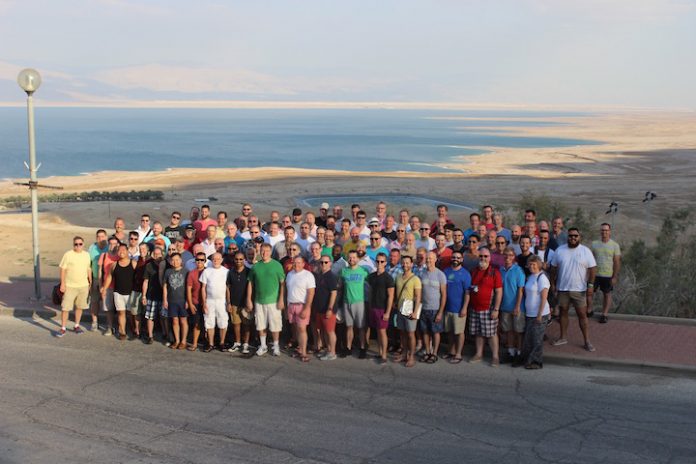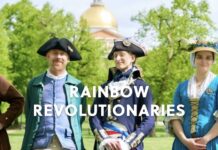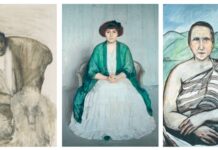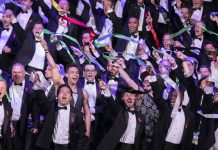What a difference a day makes.
On June 26, 2015 the members of the Boston Gay Men’s Chorus were in Istanbul, in the midst of the first-ever tour of the Middle East by a gay chorus. News came in: America’s Supreme Court had ruled that marriage equality would be the law of the land in all 50 states. There were tears of joy. “It was one of the most joyous moments of my life. I met my husband in the Chorus,” says Crosby, a member of the BGMC’s board of directors. “We sing next to each other in every concert. The last paragraph of Justice Kennedy’s decision was stunning in its simplicity, beauty and humanity. We all just hugged each other.” It was an exciting moment.
On June 27, 2015 the members of the Boston Gay Men’s Chorus performed at Istanbul’s Bogacizi University, which had stepped in to host their concert after a previously contracted venue, The Zorlu Center, cancelled ticket sales under pressure from anti-gay forces. The show must go on, so after an outpouring of emotional offers from other locations, the BGMC closed its free, open-air show at Bogacizi with Katy Perry’s “Firework”—during which they were joined onstage by Charles Hunter, the out and married US Consul General in Istanbul. “I’ll never forget this one gay kid, maybe 18 years-old, waif-life and effeminate, who bounced up to me before the concert and said ‘Thank you for being here, this is so important to me,’” recalls BGMC executive director Craig Coogan. “At the end of ‘Firework,’ he pushed himself to the front row, dancing with his whole body, and ran up to me, throwing his arms around me and squeezing me, with tears running down his face.” It was an inspiring moment.
Then:
On June 28, 2015 the members of the Boston Gay Men’s Chorus were preparing to march in Istanbul Pride when they learned that Turkish authorities had suddenly revoked the event’s permit—ostensibly because Pride coincided with Ramadan. (Though it had in years past, without issue.) There was threat of violence: Turkish police blockaded the city’s Taksim Square armed with rubber bullets, tear gas and water cannons—weapons that, as haunting news photos would later show, were indeed used on those who attempted to gather. Chorus members were crestfallen; many cried. This was to be the climax of a history-making tour to inspire unity and love. How had hugs turned to threats? How had singing turned to shouting?
“Having a policeman in my face telling me that the parade had just been cancelled, and that if we tried to enter Taksim Square the police would use water canons, rubber bullets and tear gas to turn us away, was one of the most horrifying experiences of my life,” says longtime BGMC music director Reuben M. Reynolds III. “I was not scared of their threatened actions—what horrified me was that the government felt they had the right to do this to me just because I am gay. Many of us have forgotten—or never knew—what it is like to truly fight for our rights.”
Indeed, as successes grow in our corner of the globe, the wider world—and our larger LGBT community—has a long way to go to attain full, complete harmony. And that is exactly why the BGMC went on tour in the first place.
“When I came to Boston and took this job, we went through a whole strategic planning process. Boston is about as gay-friendly as it comes, so it raised the question: If we’re not fighting against or for something, why are we relevant? What is our point?” explains Coogan, who joined as exec director in 2012. “Well, our point is to tell our stories to others.”
For the BGMC, advocacy through art is nothing new. After all, this is the same chorus that in 2004, during a constitutional convention that threatened to quash the Supreme Judicial Court’s ruling in favor of equal marriage in Massachusetts, hand-delivered CDs of the song “Marry Us” to legislators. (Vocal chords have a way of plucking at heartstrings.) Nor is it the first time that the chorus has taken its message abroad. In 2005, 120 chorus members took part in a European tour to Berlin, Germany; Prague, Czech Republic; and Wroclaw, Poland, where the BGMC—the first gay chorus to perform in that country—received a particularly hostile reception. There, a right-wing group that had pressured for the cancellation of the Chorus’s concert threatened to buy out the venue; angry protestors yelled anti-gay slurs as members, protected by police escorts armed with riot gear, arrived at the venue. In many respects the experience was frightening—but it was also enlightening and informative.
“After the Boston Marathon bombings I started thinking how little most of us knew about other parts of the world and about other religions. I thought back to our tour of Europe 10 years ago and how much it changed us,” explains Reynolds of how the subsequent idea to tour the Middle East came about. “We came home from that experience with a much greater knowledge of—and empathy for—people and traditions we had never known before. It seemed to me that if we could do the same thing again—get to know people and their traditions—that we in our own small way could begin to open a dialogue aimed at understanding a people totally foreign to us and, at the same time, begin to help them understand us.”
And in fact, compared to the group’s experiences in Poland, the climate that greeted the BGMC through most of its Middle East experience was warm and welcoming, say members. During the first part of the two-week Middle East tour the chorus visited Israel, where the BGMC became the first gay chorus to perform in the kibbutz of Ein Gedi, a majestic oasis at the shore of the Dead Sea; Tel Aviv, where they appeared on Israeli TV News and visited the Tel Aviv Gay Center; and Jerusalem, where their concert benefited the Jerusalem Open House for Pride and Tolerance, an organization providing direct services to the area’s LGBT population.
It was when the group arrived in Istanbul that tensions began to mount. The Zorlu Center’s about-face weeks earlier hinted at the resistance to a gay chorus from the country’s conservative ideologues. But the rescheduled concert at Bogacizi went off without a hitch—albeit under the usual personal security detail arranged by ACFEA, the international tour consultants who also arranged logistics for BGMC’s 2005 European outing—and chorus members were struck by the warmth of its Istanbul audience, which wasn’t even a strictly LGBT crowd.
“I had this prejudice going in that there was going to be a huge turnout of really activist LGBTs, ‘We’re here to change the world’-type people. Sort of a version of 1960s American activism,” says Coogan. “But I looked out at an audience of thousands of people who showed up, and it wasn’t just the activists, but husbands and wives with their kids. It was an incredibly diverse, progressive audience.”
Though, of course, it still meant most to certain folks. “I’ll never forget one gay man who came up tell me in his broken English that he flew from Jordan to Istanbul because it was so important for him to be a part of this.”
After that joyous performance, the BGMC wasn’t prepared for the events of the next morning, when they arrived to Taksim Square to march in Istanbul Pride and were told in no uncertain terms that Turkish forces had pulled the plug. “All of a sudden this wall of police officers in combat gear cut us off. Honestly, my first thought was, ‘Oh look, we have a police escort!’ How dramatically that changed,” says chorus member Izzy Berdan. “Our translator ran to the front and was chatting with the police officers. They told him that as of this morning there was no permit, and that if we didn’t go back they had tear gas and rubber bullets. We could be detained. I’m just standing there thinking, ‘I don’t know what to do.’”
Together the group returned to the hotel to debate its next steps: Should they march anyway, even under threat of violence? Members had different perspectives, but ultimately the BGMC leadership made the call: As an organization, it would not march.
“We decided that, as an organization, we would not march,” says Coogan. “The safety of our members was our number one concern. And we had done what we came here to do: To open hearts through music. That is our form of activism.”
Still, it was an emotional moment. “People were crying, because we did get very close to members of the community there — and we knew what their aspirations were, because we’ve lived them all too,” says Crosby. “All they wanted to do was be together and ask for the same rights as anyone else.”
Though the BGMC wouldn’t march as a group, individual members were free to do as they pleased — and many did return to the streets to see the state of affairs. Among them was Berdan, an artist and photographer who dedicated much of his time in the Middle East to capturing the people and places of the tour through his camera lens. The results, to be published in a photo book, are stunning. Some are staged portraits, capturing some of the gay men he met in the Middle East posing nude amid the region’s natural beauty; in drag, waving a bright red flag that Berdan brought as a prop to symbolize the heightened emotion of the experience; or wrapped in a burka-like textile sculpture that resembles the American flag.
Others images, though, are more candid captures of police activity in Istanbul, streets deserted after the violent melee, and groups of Turkish students who gathered in support. After authorities turned weapons like water canons on the peaceful protestors still gathered by Taksim Square, crowds were forced down side streets alleys to regroup. Many would spend the day holed up with one another in bars and restaurants, reemerging after dark into Taksim Square’s typical nightlife scene. Although by then the assaults were over, police presence lingered on.
“It was so frustrating to see that this is still happening. It was such a shame to see your fellow brothers and sisters being attacked,” recalls Berdan. “As I bounced around with my camera, I’d weave my way down different side streets. You’d see people in a park sitting down and protesting. You’d come across someone screaming at a cop. Sometimes you could definitely see that the cops were the aggressors; other times they just seemed like normal kids, taking selfies. And then there was the juxtaposition of a group of cops running by you in riot gear, with a crowd of people passing by you with red eyes and freshly bandaged arms, I’m guessing after some kind of beating. It was bizarre.”
And yet, despite the fear and intimidation that accompanied their final hours in the Middle East, chorus members say that it’s the shared sense of humanity that will stick with them the most.
“Every place we visited, it was more the similarities than the differences that struck me,” says Crosby. “One of the most moving things about the trip was visiting the Holocaust History Museum in Jerusalem. And what I realized there is that humanity is all the same: We’re always cruel to each other. And yet, we can also be incredibly brave and generous for each other. The first step toward treating people badly is to dehumanize them — the Holocaust was the systemic peak of that. But when you look around in society, like at a Pride march in Istanbul where you’re able to turn on your fellow peaceful citizens with water canons, you realize that it’s time to have a conversation about how, sadly, we’re not beyond it.”
“Extremists create the noise that distracts us from our common humanity,” adds Crosby.
But the BGMC will continue to create the music that refocuses attention to it. Included in the BGMC’s program was a specially commissioned work, “Peace,” composed using lyrics crowd-sourced from chorus members about memories of a moment when they felt truly at peace. And the chorus will continue to build new memories of sharing love — and peace — around the world.
“The one thing that I brought home from this tour is that we are all in this together,” says Reynolds. “As wonderful as it is to have the right to marry here in the U.S., we have to remember that it is just one step in the journey our sisters and brothers are taking all over the world. We must be part of that journey with them.”
To view Izzy Berdan’s photographs from the Middle East tour, and for information on purchases, visit izzyberdan.com/collections
This article appears in the September/October 2015 issue of Boston Spirit magazine.









